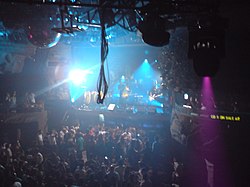History
Sussie 4 was formed in the summer of 1998 in Guadalajara, Mexico, by music producer César Gudiño (keyboards, synths, program systems) and instrumentalist Odín Parada (guitar, percussion, voice). They began experimenting with a fusion of organic and electronic music. With strong influences in French house, their sound mixes Latin rhythms with jazz and pop in avant-garde ways.
The term which best defines their sound is the one that gives title to their debut album, Música Moderna (modern music), released in 2002 by Nopal Beat/EMI. Music from this album was featured in a number of popular compilations of electronic music and helped the band become known in the electronic music scene throughout Australia, Japan, Germany, Spain, Portugal, Brazil, and other countries worldwide.
In all four of their studio albums, Sussie 4 have collaborated with various well-known Latin singers and artists, such as Denisse Guerrero of Belanova, Ale Sergi of Miranda!, León Larregui of Zoé, Valentina González, and Ely Guerra.
This page is based on this
Wikipedia article Text is available under the
CC BY-SA 4.0 license; additional terms may apply.
Images, videos and audio are available under their respective licenses.
